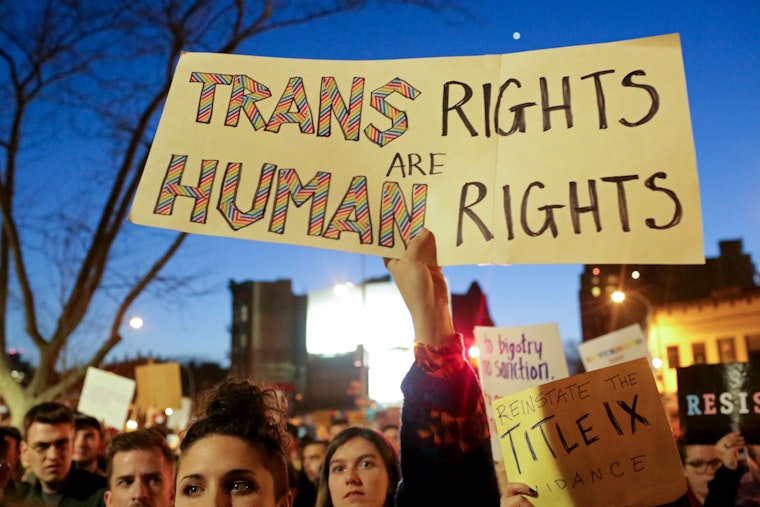A Perilous Moment for Transgender People in the United States
By Sebastian Kohn

In the 2018 U.S. midterm elections, two-thirds of voters in Massachusetts firmly rejected a ballot initiative that would have repealed statewide protections against gender identity discrimination in public places. This was a critical victory at a time when the Trump Administration is intensifying its efforts to erase federal protections and recognition of trans people altogether.
The Trump Administration’s latest assault on the rights of transgender people surfaced on October 21 in a draft memo leaked from the Department of Health and Human Services. The document details an effort to legally define gender as something determined “on a biological basis”—that is, binary, unchangeable, and set by physical attributes at birth.
Perhaps most brazenly, the memo argues for using Title IX, the federal civil rights law banning discrimination in education programs, as a vehicle for creating the discriminatory policy. But it is hardly the only attempt to deny trans people their rights. In courts, state houses, and federal agencies, the fight against trans rights has reached a fever pitch since Trump took office.
The list of such efforts is long. In February, the Department of Education announced it will reject all complaints related to transgender students’ bathroom access. A revised Transgender Offender Manual from the Bureau of Prisons specifies that housing assignments should be based on “biological sex” and only take gender identity into consideration “in rare cases.” And another memo in from the Department of Justice instructs its attorneys to argue that federal law does not protect trans workers.
Memos and executive guidance, of course, do not change the law. Since the 1990s, federal courts have consistently ruled that legal protections against sex discrimination cover discrimination against trans people in employment, education, and healthcare. Executive guidance does matter, however, in terms of what support—if any—trans people can expect from the federal government.
The position of the government also sends a signal to others that it’s okay to discriminate. And the federal government’s arguments in court may actually change the law in the longer term. Of course, Congress could pass federal legislation that expressly prohibits discrimination on grounds of gender identity and sexual orientation, but that’s unlikely to happen, and as a result, courts are afforded with a whole lot of power in making such determinations.
Several cases of anti-trans discrimination have been or are about to be appealed to federal courts, including the Supreme Court. They could turn out to be decisive. Last month, the Department of Justice submitted its brief to the Supreme Court in the case of R.G. & G.R. Harris Funeral Homes Inc. v. Equal Opportunity Employment Commission, where it argues that Title VII, a federal law that prohibits employment discrimination, “does not apply to discrimination against an individual based on his or her gender identity.” The American Civil Liberties Union (a grantee of the Open Society Foundations) represents Aimee Stephens, who was fired in 2013 for being transgender.
Federal protections against discrimination aside, many states, counties, and municipalities have their own laws that expressly prohibit discrimination against LGBTI people. The Movement Advancement Project (MAP) provides a great overview of protections by state. But there are multiple efforts in court to try to strike down local protections as unconstitutional. For example, in the past month the U.S. Pastor Council and Texas Values, two Christian right advocacy groups, have launched two cases arguing that protections against LGBTI discrimination violate their religious freedoms. Another case in Minnesota has already reached the Court of Appeals for the Eighth Circuit. If cases such as these were to reach the Supreme Court, they could result in the obliteration of state and local protections everywhere. In other words, no need for another bigoted ballot like the one that failed in Massachusetts. No wonder people are worried.
The law is, of course, only one piece in all of this. At least as important are the messages that the government sends to LGBTI people. A recent study found extraordinarily high rates of attempted suicide among young trans people in the United States. It shows that memos like the one recently leaked by the government cause harm that goes well beyond policy, and that they can be easily interpreted as efforts to dehumanize and effectively erase trans people.
If you know anyone who struggles in times like these, there are many good resources out there. For example, the Trevor Project provides crisis intervention services for young LGBTI people, and the Trans Lifeline has a service specifically dedicated to trans people.

Sebastian Kohn is a division director in the Open Society Foundations’ Global Programs.


